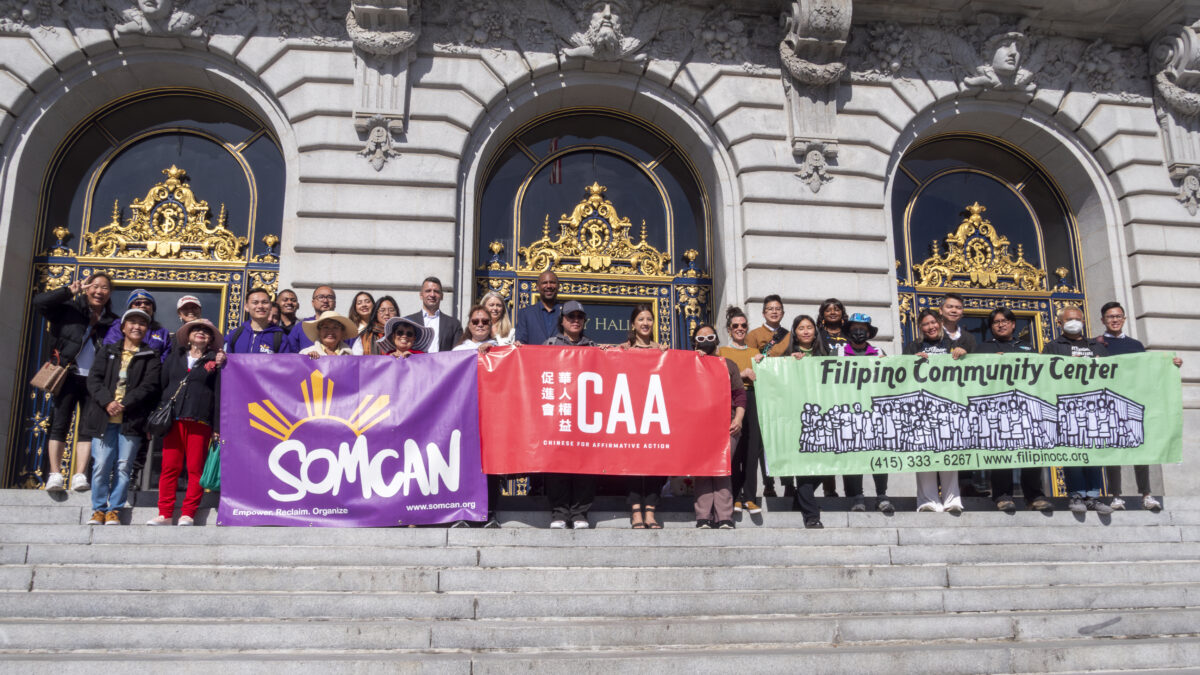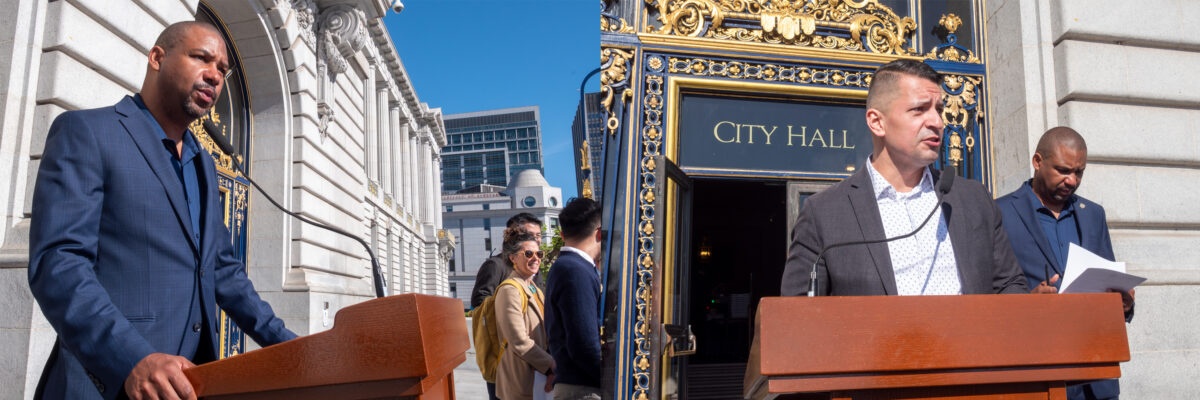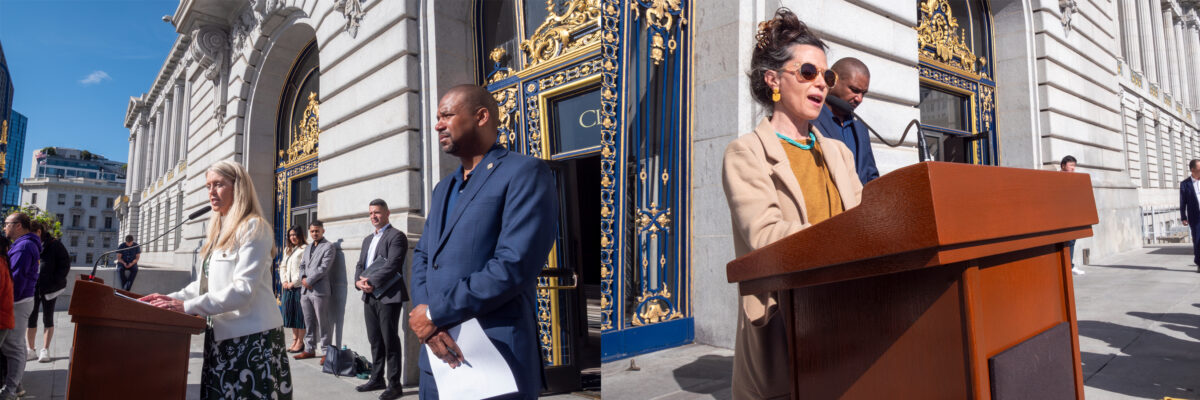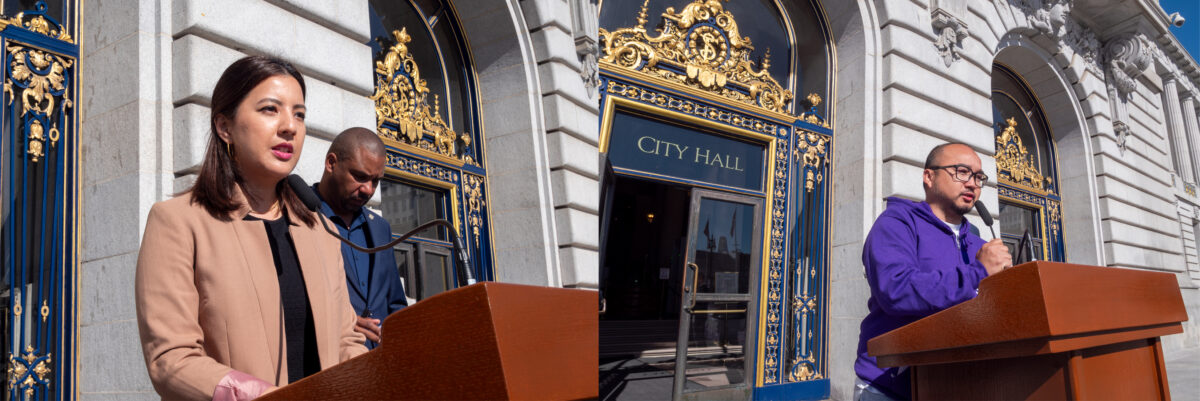Legislation expands language access services to immigrant communities

Supervisor Shamann Walton and community advocates and organizations – including the Filipino Community Center – hold a rally at City Hall. Photo by Wilfred Galila
SAN FRANCISCO – The San Francisco Board of Supervisors Rules Committee unanimously passed the proposed amendments to the Language Access Ordinance (LAO) to applause and cheers by community members and advocates at a hearing in City Hall this week.
The amendments will expand and strengthen language access services to San Francisco’s linguistically diverse immigrant communities. Language access is crucial for recognizing the civil rights of limited English proficient (LEP) people, who may face unfair treatment by local governments because of language barriers.
Prior to the May 6 hearing, Supervisor Shamann Walton and community advocates held a rally at the steps of City Hall announcing additional amendments to strengthen San Francisco’s LAO.
The additional amendments include lowering the city’s official language threshold from 10,000 to 6,000 LEP residents who speak a shared language. This will make Vietnamese an official certified language for the city and county of San Francisco in two years.
The LAO currently requires city departments to provide language access services in Chinese (Cantonese and Mandarin), Spanish and Filipino.

Supervisor Shamann Walton (left) and Jorge Rivas, director of OCEIA. Photo by Wilfred Galila
The Office of Civic Engagement and Immigrant Affairs (OCEIA) will also expand responsibilities to help city departments build their language access capacities.
“Our immigrant communities contribute to the cultural fabric and economy of San Francisco. We need to continue to expand and strengthen our language access services to ensure that everyone can participate in city processes,” said Supervisor Shamann Walton of District 10.
“These amendments to the Language Access Ordinance came from a collaborative process between our office, Supervisor Chan, the Office of Civic Engagement and Immigrant Affairs, the Immigrant Rights Commission, the Language Access Network and community advocates. We will continue to work with all of our city departments to make sure we deliver quality language access services.”

Immigrant Rights Commission Chair Celine Kennelly (left) and Vanessa Bohm, director of CARECEN SF’s Family Wellness and Health Promotion Program. Photo by Wilfred Galila
The amendments to San Francisco’s LAO include:
- Implementing updated provisions of the Dymally-Alatorre Bilingual Services Act for emergency and disaster translation services
- Updating findings on language access in San Francisco
- Including public service announcements of vital information in multiple languages
- Lowering the language threshold requirement from 10,000 to 6,000 residents, now including
Vietnamese, effective two years from the passage of the ordinance - Requiring city departments to maintain lists of bilingual employees and their languages
- Providing written materials in requested languages for LEP persons within 48 hours, with good faith efforts for translation within a reasonable amount of time
- Establishing a streamlined complaint process through OCEIA for language access service difficulties while informing the public about complaint procedures and feedback mechanisms
- Creating a multilingual know-your-rights brochure
- Developing standardized vocabulary lists for required languages
- Prominently displaying language access service availability in city buildings
- Clarifying interpretation vs. translation in the ordinance
- Strengthening OCEIA’s role in enforcing compliance, providing guidance and helping build capacity for city departments
- Expanding language access for digital services and social media
- Memorializing required languages: Chinese, Spanish and Filipino
- Mandating translation of signage
- Codifying language access protocols for first responders
- Requiring quarterly publication of complaints and annual Language Access Summary Report to be sent to the Board of Supervisors
- Emphasizing departmental responsibility for language access budget and bilingual staff
“The proposed amendments aim to remove barriers to participation in city processes by encouraging departments to increase bilingual staffing levels and language services, improve accessibility through continued digital and telephonic language services, and increase language services planning and coordination for public health crises, disasters, and emergencies,” according to a statement from the office of Supervisor Walton.

CAA Policy Manager Anisha Hingorani (left) and PJ Eugenio, workforce counselor of SOMCAN. Photo by Wilfred Galila
Supervisor Walton has been working closely with OCEIA and community partners in the creation of “community-driven amendments” to strengthen the existing LAO.
Among the community-based organizations present, who are also part of the Language Access Network of San Francisco (LANSF), were South of Market Community Action Network (SOMCAN), Filipino Community Center and Chinese for Affirmative Action (CAA).
Also present were Jorge Rivas, director of OCEIA; Celine Kenelly, chair of Immigrant Rights Commission; and Vanessa Bohm, director of Central American Resource Center (CARECEN) SF’s Family Wellness and Health Program who all spoke at the rally.
Representatives from the community-based organizations also spoke about the importance of straightening San Francisco’s LAO.
“Nearly one in five San Francisco residents identifies as Limited English Proficient. This means that access to information and services for many depends on our ability to communicate in multiple languages,” said OCEIA director, Jorge Rivas. “These amendments will help ensure equal access to City services and vital information for all San Franciscans, making our city safer, healthier and more just for all.”
Immigrant Rights Commission Chair Celine Kennelly said the commission has fought for language justice since it was founded 25 years ago.
“We advocated for the first iteration of the Language Access Ordinance in 2001 to ensure equal access to City services for all San Franciscans,” she said. “Today, the Immigrant Rights Commission is pleased to join with City leaders in taking another step forward in improving language access.”
“Language access is a cornerstone of democracy and social justice,” said CAA Policy Manager Anisha Hingorani. “In a city as diverse as San Francisco, linguistic inclusivity isn’t just a goal – it is an obligation. By breaking down barriers, we not only enhance communication but also uphold the values of fairness, dignity and opportunity for all.”
“The new amendments will broaden language access for our immigrant community members, including expanding telephonic interpretation and written translation for all languages,” said CARECEN SF’s Family Wellness and Health Promotion Program Director Vanessa Bohm. “This is extremely important as we see more newly arrived immigrant families, including from parts of Mexico and Central America, where many speak a Mayan language as their native language and would more comfortably and effectively access services being able to speak their native language.”
“That’s why we applaud the efforts of everyone here today and their leadership to strengthen the Language Access Ordinance with amendments like the right to telephonic interpretation and written translation for all languages,” said SOMCAN’s workforce counselor, PJ Eugenio. “We look forward to the Board resolution that will continue our collective effort with OCEIA to work with the community on addressing key equity concerns.”
The COVID-19 pandemic made clear the language access barriers and inequities for LEP persons and that city departments needed to “prioritize language access services during health-related emergencies, disaster-related activities and all other public safety crises.”
This is to be done “through a community-focused approach that can effectively communicate with residents who speak or are more comfortable in their native language.”
According to OCEIA’s recent Annual Language Access Report, “there are still gaps in language services affecting the City’s ability to serve all of its residents and provide timely access to information to enable full participation in City services and programs.”
Currently, the LAO only applies to services and information provided by the city and county of San Francisco. It does not apply to general businesses, health providers and organizations.

